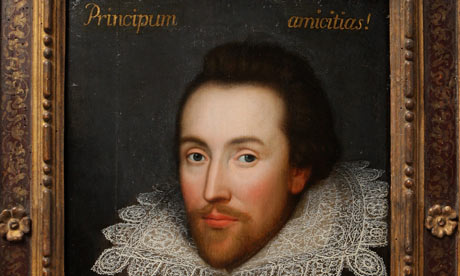Give up?
 |
| Such a sweet face for such a depraved man! |
Okay, so that's not the whole story, I know that. But it constantly surprises me how Shakespeare, like the Bible, can be co-opted for such a variety of viewpoints. To some, he's a bastion of rational, almost scientific Enlightenment humanism: "What a piece of work is man!" To others he's obviously a man of deep religious faith, with his repeated references to heaven and hell, mercy vs. justice, the role of God and the clergy in affairs of men.
I've read someone say of him that, "Shakespeare seems too wise to believe anything." It's another way of explaining that we fill in the blanks for him, like an Elizabethan MadLibs. When is he being serious, when is he mocking us? It can be hard to tell.
I love high school graduation speeches where kids quote Polonius, "Hamlet's" fatuous windbag: "This above all, to thine own self be true." If Shakespeare intends this as a serious entreaty from father to child, why have the gassy, silly old man say it?
But as complicated as the plays are, Shakespeare's sonnets are way more convoluted. There's a great article from the Guardian that I HIGHLY recommend, in which an excellent poet takes on the sonnets. The blurb reads, "Don Paterson braves lit crit's Bermuda Triangle: Shakespeare's sonnets." I like the description: the bravest and best-equipped critics often vanish into that mysterious area, sometimes emerging with nothing, sometimes with nonsense or tall tales, and only rarely with anything more valuable than empty beer cans or candy wrappers.
Here's Paterson's intro to the poems:
First, a word about the sonnets themselves. They consist of 154 poems first published in 1609 as Shake-speares Sonnets. Never before imprinted. They can be neatly divided into three main groups. The first is a run of 17 poems, which all embroider the same theme; with two or three exceptions, they are so dull it's a wonder anyone ever reads any further. These are the so-called "procreation sonnets", in which Shakespeare urges an unnamed young man to marry and reproduce, so his beauty will survive. I agree with William Boyd[...] that they read a lot like a commission, and could well have been paid for by the Young Man's mother, perturbed by his Lack of Interest in the Opposite Sex.
The second is a sequence of 108 poems addressed, apparently, to the same Young Man. In gut-wrenching, febrile, tormented detail, they chart the whole narrative of a love affair. Then we have a strange 12-line poem, whose "absent couplet" seems to invoke the absent couple, and symbolise the end of the affair. Then we have 28 poems addressed to a mistress, the so-called "Dark Lady" (the number 28 might echo the menses, which would fit with the poems' barely disguised obsession with the uncleanliness of women's bodies), and then a bizarre pair of poems to close with.
With an intro like that, who WOULDN'T want to read this stuff?
Here are some more great quotes from the piece:
The argument in favour [of Shakespeare being gay] is simple. First, falling in love with other men is often a good indication of homosexuality; and second, as much as I love some of my male friends, I'm never going to write 126 poems for them, even the dead ones.
A funny line, but I'm not sure that argument holds water when you have Tennyson — straight in every sense — writing the 133 cantos of "In Memoriam" eulogizing his dead best friend.
On Shakespeare's choice of subject matter:
His strategy was twofold. First, he realised that human love was the one theme capacious enough to encompass every other – these are also poems about death, sex, politics, sin, time and space – and he needn't stray from its centre. Second, he did this with a minimum of experiment, writing the form into transparency, until it became as effortless as breathing. In other words, he converted the rules of the sonnet to motor skills.
On Shakespeare's technique:
I wanted to say something to counteract the perception of Shakespeare's compositional method as a kind of lyric soduku, and put in a word for the kind of glorious, messy procedure I'm quite certain it was, whatever the crystalline and symmetrical beauty of the final results. Like most poets, Shakespeare uses the poem as way of working out what he's thinking, not as a means of reporting that thought.
Suffice it to say, check the article out. It's long but it's so worth it. Make a bookmark and come back if you don't have the time now. It's a really clear-eyed and fascinating take on a subject that has been beaten to death while remaining still largely misunderstood.
Here's one of his sonnets with some of the most vivid and clear imagery, and a minimum of obscure 16th-century cuckolding puns.
Sonnet XIX
William Shakespeare
Devouring Time, blunt thou the lion's paws,
And make the earth devour her own sweet brood;
Pluck the keen teeth from the fierce tiger's jaws,
And burn the long-liv'd phoenix, in her blood;
Make glad and sorry seasons as thou fleet'st,
And do whate'er thou wilt, swift-footed Time,
To the wide world and all her fading sweets;
But I forbid thee one most heinous crime:
O! carve not with thy hours my love's fair brow,
Nor draw no lines there with thine antique pen;
Him in thy course untainted do allow
For beauty's pattern to succeeding men.
Yet, do thy worst old Time: despite thy wrong,
My love shall in my verse ever live young.
No comments:
Post a Comment